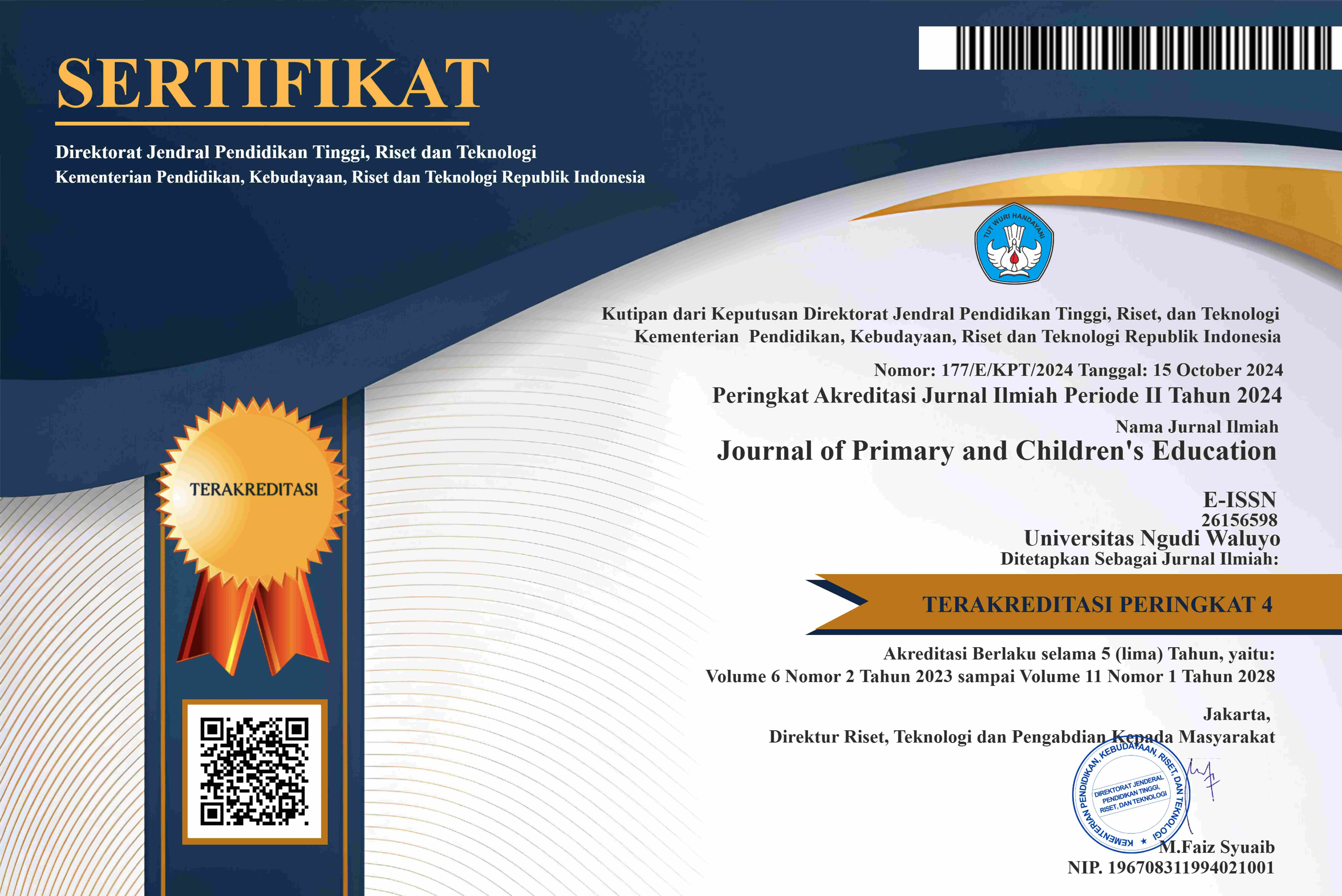INTEGRASI TECHNOLOGICAL PEDAGOGICAL AND CONTENT KNOWLEDGE DALAM PERANGKAT PEMBELAJARAN TEMATIK KELAS 3
DOI:
https://doi.org/10.35473/jnctt.v4i2.1139Abstract
This study aims is to describe the integration of TPACK (Technological Pedagogical and Content Knowledge) in class 3 thematic learning device, theme 7 sub-theme 4 SDIT Pelita Hati. The type of research used in this research is descriptive qualitative. This research design is classified as content analysis research because it involves connecting or comparing findings with several criteria or theories. The research subjects used quota sampling, namely learning devices for class 3, theme 7 (Technology Development), sub-theme 4 (Development of Transportation Technology), 1st learning and 2nd learning. The data collection in this study uses a documentation technique which is then analyzed using data analysis techniques Miles, M.B, Huberman, A.M, (2014) which consists of three flow of activities that occur simultaneously, namely: data reduction, data presentation, and conclusion drawing. Based on the available data, each TPACK component has been integrated in the learning tools for class 3, theme 7, sub-theme 4, 1st lesson and 2nd lesson, SDIT Pelita Hati Randublatung. However, there are still some indicators of TPACK components that have not been integrated into learning tools. This is because several CK and PK components have not been implemented, thus affecting the integration of other TPACK components.
References
Ambaryati. (2019). Profil TPACK Guru SD Negeri Kecamatan Tengaran Kabupaten Semarang Tahun 2018. 1–8.
Dhawati, D. A. A., & Hariyatmi. (2017). Kemampuan Technological Knowledge ( TK ) Calon Guru Biologi FKIP UMS. Seminar Nasional Pendidikan Biologi Dan Saintek II, 649–654.
Harris, J., Phillips, M., Koehler, M., & Rosenberg, J. (2017). TPCK/TPACK research and development: Past, present, and future directions. Australasian Journal of Educational Technology, Vol. 33 (3, I–VIII. https://doi.org/doi.org/10.14742/ajet.3907
Koh, J. H. L., Chai, C. S., Benjamin, W., & Hong, H.-Y. (2015). Technological Pedagogical Content Knowledge (TPACK) and design thinking: A framework to support ICT lesson design for 21st century learning. The Asia-Pacific Education Researcher, 24 (3), 535–543. http://dx.doi.org/10.1007/s40299-015-0237-2
Lexy J. Moleong. (2018). Metodologi Penelitian Kualitatif (Edisi revi, p. halaman 405-410).
Mahmudah. (2018). Pengelolaan Kelas: Upaya Mengukur Keberhasilan Proses Pembelajaran. Jurnal Kependidikan, 6(1), 53–70. https://doi.org/10.24090/jk.v6i1.1696
Mairisiska, T., Sutrisno, & Asrial. (2014). Pengembangan Perangkat Pembelajaran Berbasis TPACK pada Materi Sifat Koligatif Larutan untuk Meningkatkan Keterampilan Berpikir Kritis Siswa Development TPACK Based Learning Devices on Colligative Properties to Improve Critical Thinking Skill Students. Jurnal Edu-Sains, Edu-Sains.
Miles, M.B, Huberman, A.M, & S. (2014). Book Review: Qualitative Data Analysis. A Methods Sourcebook.
Muryaningsih, S., & Mustadi, A. (2015). Pengembangan RPP Tematik-Integratif Untuk Meningkatkan Karakter Kerja Keras Di Sekolah Dasar. Jurnal Prima Edukasia, Vol. 3, Hal. 190-201. https://doi.org/ISSN: 2338-4743
Rahayu, T., Rahayu, S., & Artikel, I. (2014). Analisis Isi (Content Analysis) Buku Sekolah Elektronik (Bse) Pelajaran Pendidikan Jasmani Olahraga Dan Kesehatan Smp Kelas Viii Di Kota Semarang. Journal of Physical Education and Sports, 3(1), 1–5. https://doi.org/10.15294/jpes.v3i1.4780
Setiyati, E. (2013). Peningkatan Kemampuan Membuat RPP dan Menerapkan Pembelajaran Dengan Pendekatan Tematik Melalui Pembinaan Akademik Lewat Pemberdayaan KKG Bagi Guru SD. Jurnal Manajemen Pendidikan, Vol. 8, Hal. 70-80.
Sintawati, M., & Indriani, F. (2019). Pentingnya Technological Pedagogical Content Knowledge ( TPACK ) Guru di Era Revolusi Industri 4 . 0. 417–422.
Sukaesih, S., Ridlo, S., & Saptono, S. (2017). Analisis Kemampuan Technological Pedagogical and Content Knowledge (TPACK) Calon Guru Pada Mata Kuliah PP Bio Jurnal Nasional, Hal. 58-64.
Suryono, A. F. (2017). Kemampuan TPACK (Technological Pedagogical Content Knowladge) Guru IPA SMP Muhammadiyah Kelas VII di Kota Rembang Ditinjau Dari Penyusunan Rencana Pelaksanaan Pembelajaran Tahun Ajaran 2016/2017.
Sutrisno. (2011). Pengantar Pembelajaran Inovatif Berbasis Teknologi Informasi & Komunikasi. Jakarta, Gaung Persada Press.
Utami, K. N., & Mustadi, A. (2017). Pengembangan Perangkat Pembelajaran Tematik dalam Peningkatan Karakter, Motivasi, dan Prestasi Belajar Siswa Sekolah Dasar. Jurnal Pendidikan Karakter, 14–25.
Valtonen, T., Sointu, E. T., Mäkitalo-Siegl, K., & Kukkonen, J. (2015). Developing a TPACK measurement instrument for 21st century pre-service teachersi. International Journal of Media, Technology and Lifelong Learning, Vol. 11(Issue 2).
Wijayanto, B. (2017). Urgensi Technological Pedagogical Content Knowledge (TPACK) dalam Pembelajaran Geografi. Vol.6, 54–60.
Yusrizal. (2016). Pengukuran & Evaluasi Hasil dan Proses Belajar. In Pale Media Prima: Vol. Pertama (Issue Oktober 2016).
Published
How to Cite
Issue
Section
License
Copyright notice:
- Authors retain copyright and grant the journal right of first publication with the work simultaneously licensed under Creative Commons Attribution License that allows others to share the work with an acknowledgement of the work's authorship and initial publication in this journal.
- Authors are able to enter into separate, additional contractual arrangements for the non-exclusive distribution of the journal's published version of the work (e.g., post it to an institutional repository or publish it in a book), with an acknowledgement of its initial publication in this journal.
- Authors are permitted and encouraged to post their work online (e.g., in institutional repositories or on their website) prior to and during the submission process, as it can lead to productive exchanges, as well as earlier and greater citation of published work (The Effect of Open Access)







